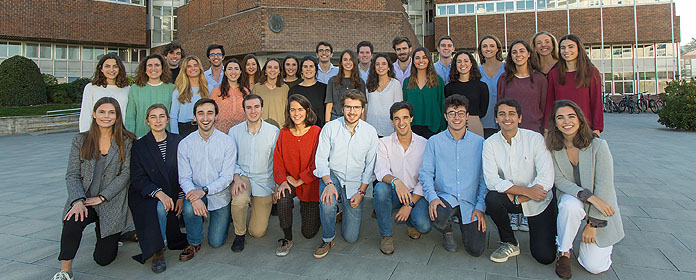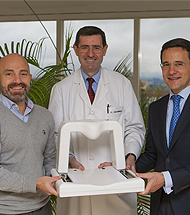20031003-Un Nobel de Medicina pronostica que el genoma humano podría ayudar a curar en 20 años algunos cánceres
Nobel Prize in Medicine predicts that the human genome could help cure some cancers within 20 years
Dr. John Sulston suggests at the University that research should be done to improve the quality of life rather than to lengthen it.
"In 20 years some types of cancer will be cured thanks to research on the human genome. The future lies in the study of genetic differences. By comparing the genes of the healthy part with those damaged by cancer, it will be possible to identify new therapeutic targets. This was stated by John Sulston, Nobel award in Medicine 2002, at a press conference on the occasion of the 5th Eduardo Ortiz de Landázuri Memorial Lecture organized by the School of Medicine of the University of Navarra.
For the expert, the importance is not to live longer, but to improve the quality of life. "And this will be difficult, but we can make progress and deepen our knowledge many diseases of the elderly and have an impact on the progressive decline of brain function.
With respect to research funding, he said he was in favor of scientists obtaining economic benefit from these advances, always within the democratic framework . "When we talk about human health, we have to think about what we should do and not so much about what we can do. These issues should be brought to public opinion, to the whole of society".
Cloning, without ethical basisJohn Sulston also referred to cloning and stated that "there is scientific data showing that it is too dangerous. The limits are not so much in science, but in this case, ethics plays a very important role. Ethically, it is something that has no basis, since it involves destroying embryos.
This expert began investigating the human genome with the study of a small and simple animal, the worm Caernorhabditis elegans. "Although at first it was a very risky bet, it turned out that many of its mechanisms coincide with ours."
In conclusion, he commented that after dedicating so much time to research, the best contribution he can offer to society is to focus on the social and ethical aspect of science: "I am now on a committee in the UK advising the Government on the uses of Genetics".
Dr. Ortiz de Landázuri and his attitude towards patientsDr. Jesús Prieto, Full Professor and director of the department of Internal Medicine at the Clínica Universitaria de Navarra, gave a portrait of Dr. Eduardo Ortiz de Landázuri: "He never conceived of university medicine without research work. The patient was the axis of his life, the reason for his efforts and efforts. He was a seasoned clinician with vast experience in health care work, but above all, he was a caregiver of his patients and a doctor at the patient's bedside".
Finally, Dr. Prieto affirmed that, "just as buildings rest on concrete foundations that are dug into the earth, the vital strength and continuity of institutions rest on the values embodied by the people who work in them. Eduardo, following in the footsteps of St. Josemaría, has built with his life the sturdy pillars that give the University of Navarre the splendid solidity that we contemplate today. I have no doubt that the new generations that are coming and will come will not be mistaken if they continue to tread in the same footsteps that Don Eduardo did.


